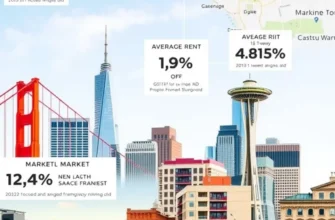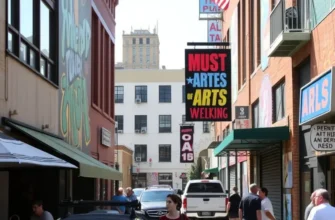Finding a new apartment when relocating to a different city can be a daunting task, especially for freelancers who thrive on flexibility and the ability to work from anywhere. Whether you’re a young professional, student, couple, family, or mobile worker, apartment hunting is often filled with uncertainties. You want to ensure you choose a place that suits your work-life balance, budget, and lifestyle preferences. This guide provides essential tips tailored specifically for freelancers looking to navigate the local rental markets in major U.S. cities. With proper research and strategy, you can find an apartment that not only meets your professional needs but also enhances your living experience. From understanding rental trends in your target city to practical on-the-ground advice, this article aims to simplify your apartment hunting journey.
Navigating City Rental Markets

Relocating as a freelancer demands an in-depth understanding of a city’s rental landscape. A knowing eye on market trends, average rent prices, and available amenities is essential. Start by browsing local rental platforms to get a sense of the average rent prices and available units in your desired neighborhoods. Comprehensive rental websites offer filters to narrow your search by neighborhood, price range, and apartment features.
Network extensively through local social media groups to gather unfiltered insights. Join city-specific groups where residents discuss everything from rental scams to rent control laws. These platforms can be invaluable for spotting red flags or discovering hidden gems.
Dive into city forums or community boards online. These may list potential rentals and neighborhood events which can help you gauge the vibe of an area. Consider reading neighborhood guides or expert blogs that summarize various locales. An article like Renting in Charleston, SC could offer unique perspectives.
Proximity to coworking spaces and coffee shops should weigh into your decision. Many freelancers find themselves working remotely, making access to these spaces vital. Use maps to plot out coworking locations and cafes in relation to potential apartments. This can also hint at the general atmosphere; vibrant areas often have more cafes and working spots.
Public transportation access can be a crucial factor in your decision. Investigate the availability and frequency of buses, trains, or subways. Being able to move around easily without a car saves time and money, which is especially important if contracts require periodic travel.
Each city boasts neighborhoods that cater to different lifestyles. Urban centers filled with nightlife might appeal to some freelancers, while quieter, family-friendly areas may attract others. Consider lifestyle amenities—parks, gyms, or community events—that can enhance your living experience.
Finally, budget carefully. Some neighborhoods offer amenities and convenience at a premium. Before committing, assess your financial situation. Construct a detailed budget accounting for rent, utilities, and transportation costs. For more detailed financial planning advice, you can refer to guides on budgeting that are specifically tailored to renters.
Your new city awaits, rich with possibilities and challenges. Employ these strategies and you’re bound to find a rental decision that complements your career flexibility and lifestyle choices.
Securing Your Ideal Apartment

Entering the apartment application process with preparedness can make a world of difference. Before stepping into a potential rental, gather all required documentation. As a freelancer, lining up your financial proof might appear challenging, but it’s crucial. Start with assembling documents like renter credit improvement tips to ensure a smooth application.
Documentation is Key
Landlords often seek to validate financial stability. Compile your most recent tax returns, a detail of your average monthly income, and bank statements showing consistent deposits. Freelancers might benefit from letters of recommendation from past clients on the consistency and reliability of their work. Do not underestimate the power of a well-drafted cover letter explaining your freelance stability and commitment to timely rental payments.
Exploring Apartments and Asking the Right Questions
An apartment might appear perfect online, but on-site visits reveal a property’s true nature. During tours, pay attention to noise levels, neighboring tenants, and overall maintenance. Test appliances, check water pressure, and observe natural lighting throughout the day. Apartments sometimes hide unpleasant surprises—never skip a personal tour.
Lease terms can often be flexible, but ask clear questions. Inquire about parking, pet policies, and any potential hidden fees. For freelancers, it’s particularly valuable to clarify the wifi setup and utility costs to prepare for work-from-home needs. Negotiating lease terms, like start date flexibility or minor rent reductions, is not uncommon—ask directly but respectfully.
Positioning Your Freelance Work
To overcome any hesitancy from landlords regarding non-traditional income, you should portray your freelance work as a stable venture. Present a portfolio that not only demonstrates your work but also includes testimonials speaking to your reliability. Offering a larger security deposit upfront can also mitigate perceived risks.
Moving smoothly into a new city involves forethought, and approaching the application process methodically ensures that you secure a home that supports your lifestyle and professional obligations.
Final words
Relocating to a new city as a freelancer may come with its own set of challenges, but it also opens doors to exciting opportunities. By equipping yourself with the right strategies, understanding local markets, and preparing thoroughly for the rental application process, you can find an apartment that not only accommodates your work needs but also elevates your living experience. Embrace your new surroundings, connect with local communities, and don’t hesitate to ask for help from local networks. Your dream apartment awaits!









